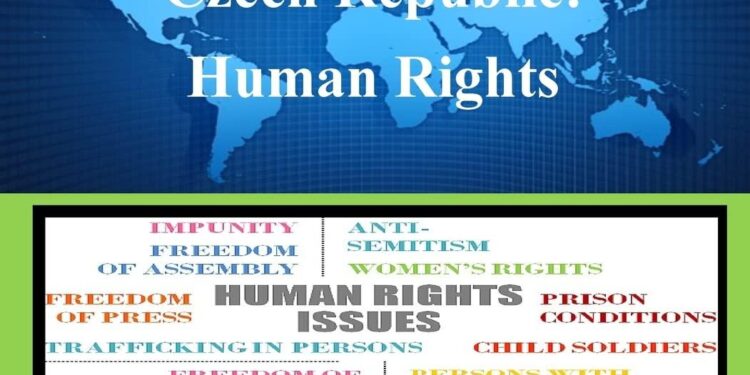The U.S. Department of State has released its 2024 Country Reports on Human Rights Practices, offering a comprehensive overview of the human rights landscape worldwide. This year’s report on the Czech Republic highlights key developments and challenges in areas such as civil liberties, rule of law, and political freedoms. As Prague continues to navigate its role within the European Union and on the global stage, the report provides critical insights into the state of human rights protections and governmental accountability in the country. This article examines the main findings and implications of the U.S. government’s assessment for 2024.
Human Rights Landscape in the Czech Republic Reviewed in 2024 State Department Report
The 2024 report on human rights practices in the Czech Republic highlights a complex landscape characterized by significant progress alongside persistent challenges. Authorities demonstrated a strong commitment to upholding democratic freedoms, including freedom of speech and assembly, while implementing reforms aimed at enhancing transparency and judicial independence. However, concerns remain regarding discrimination against ethnic minorities, particularly the Romani community, and the treatment of asylum seekers and refugees. Civil society organizations continue to play a critical role in advocating for vulnerable groups, despite occasional governmental pushback.
Key findings from the report include:
- Effective protection of press freedom, with diverse media outlets operating independently.
- Incidents of hate crimes and xenophobia persisted, prompting calls for stronger law enforcement responses.
- Ongoing challenges in the prison system, including overcrowding and limited access to healthcare.
- Efforts to combat human trafficking showed moderate progress through increased prosecutions and victim assistance.
| Category | Status | 2023 vs. 2024 |
|---|---|---|
| Freedom of Assembly | Protected | Stable |
| Minority Rights | Improving | Positive Trend |
| Judicial Independence | Under Reform | Progressing |
| Anti-Trafficking Measures | Moderate | Enhanced Enforcement |
Challenges in Freedom of Expression and Minority Rights Highlighted
The report underscores ongoing tensions surrounding freedom of expression in the Czech Republic, particularly in the context of minority communities. Despite legal safeguards, several incidents revealed challenges in protecting dissenting voices and preventing hate speech. Authorities occasionally faced criticism for uneven enforcement of laws, which some groups argued hindered their ability to freely express cultural or political perspectives without fear of reprisal. Notably, social media platforms became hotbeds for both political discourse and the spread of discriminatory rhetoric, posing difficulties for regulation while respecting individual liberties.
Minority rights remain a focal point amid these struggles. Members of Roma, Jewish, and LGBTQ+ communities reported instances of discrimination and exclusion in public and private spheres. The government initiated targeted programs to improve integration and combat prejudice; however, activists highlighted persistent structural barriers and social stigmas. Key issues included:
- Access to education and employment opportunities
- Protection against hate crimes and harassment
- Representation in political and civic institutions
| Minority Group | Reported Challenges | Government Action |
|---|---|---|
| Roma | Social exclusion, educational gaps | Inclusive education initiatives |
| Jewish | Antisemitic incidents, vandalism | Enhanced hate crime monitoring |
| LGBTQ+ | Discrimination in workplaces | Awareness campaigns, legal protections |
Policy Recommendations Aim to Strengthen Civil Liberties and Judicial Independence
To bolster civil liberties and ensure the judiciary remains independent, the report emphasizes several critical policy measures. Strengthening legal frameworks to protect freedom of expression and assembly ranks high among recommended actions. Additionally, enhancing safeguards against political influence in judicial appointments is essential to maintain a fair and impartial court system. Authorities are also urged to increase transparency in law enforcement operations to build public trust and uphold accountability.
The policy proposals include concerted efforts to:
- Revise legislation limiting media freedom and access to information
- Implement clear criteria for judicial nominations free from partisan bias
- Promote public oversight through independent bodies and civil society engagement
- Provide regular training on human rights standards for officials and judges
| Policy Area | Key Recommendation | Expected Outcome |
|---|---|---|
| Freedom of Expression | Remove restrictive media laws | Greater press freedom and diversity |
| Judicial Appointments | Establish merit-based selection | Increased judicial impartiality |
| Transparency | Create independent oversight bodies | Improved public confidence |
In Summary
In conclusion, the 2024 Country Reports on Human Rights Practices by the U.S. Department of State provide a comprehensive overview of the human rights landscape in the Czech Republic. While the report acknowledges the country’s ongoing commitment to democratic principles and legal protections, it also highlights areas requiring attention, including issues related to minority rights and freedom of expression. As the Czech Republic continues to navigate these challenges, the findings underscore the importance of sustained efforts to uphold human rights standards in line with international norms. The report serves as a critical resource for policymakers, advocates, and the international community monitoring progress and advocating for accountability.
















